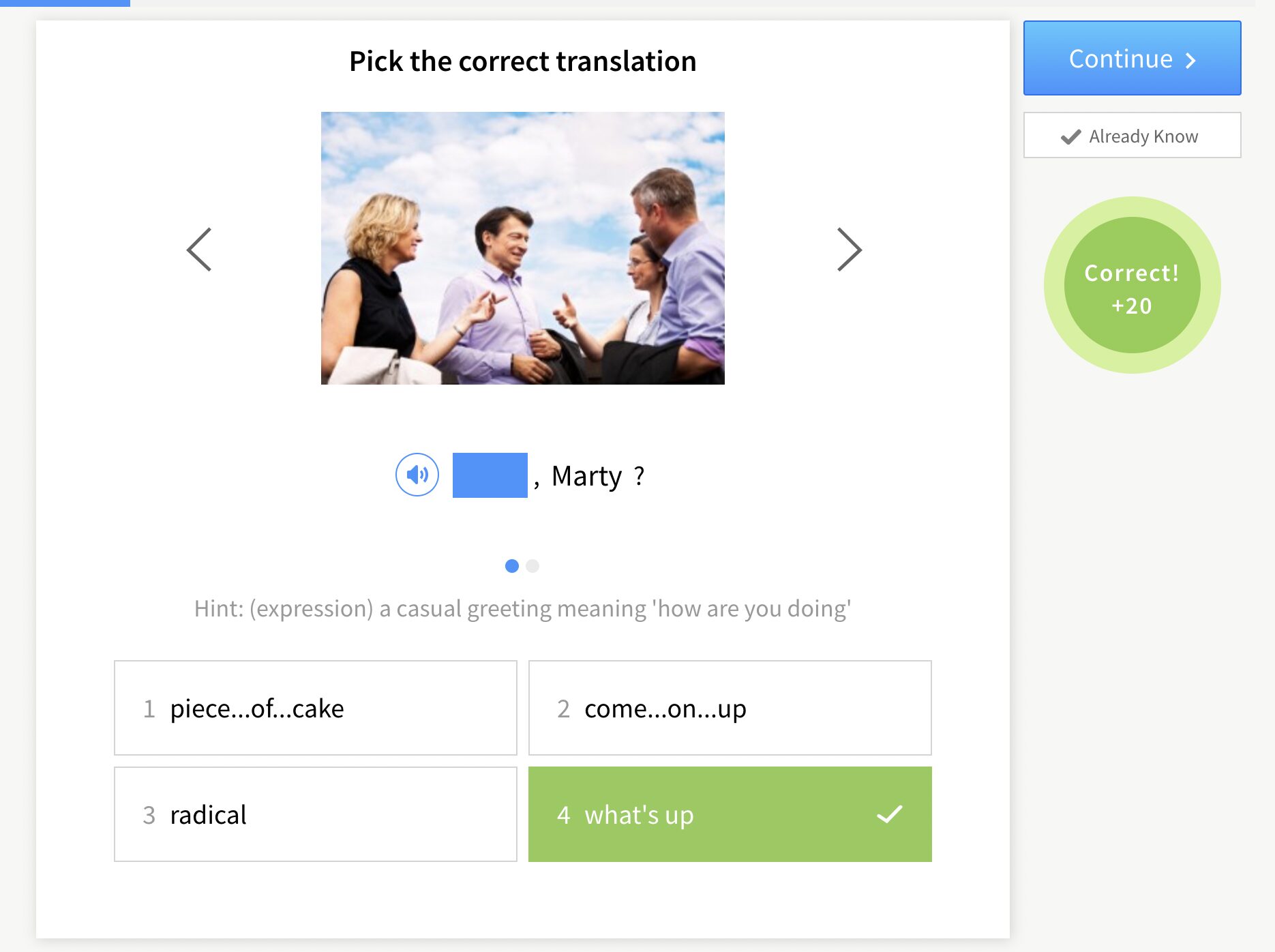Contents
- 1. Best for Debating Skills: The Bridge
- 2. Best for Advanced Students: United Nations
- 3. Best for Speaking: Antarctic Development
- 4. Best for Decision Making: Sam’s Choices
- 5. Best for General Knowledge: Jeopardy
- 6. Best for Beginners: Codenames
- 7. Best for Minimal Preparation: Heads Up
- 8. Best for Memory Skills: Running Dictation
- 9. Best for Small Groups: Sinking Ship
- 10. Best for Teams: Taboo
- And One More Thing…
10 ESL Games for Adults

Every student deserves a little fun every now and again. In this post, we’re going to take a look at the educational twists that can be put on games to help students in your adult ESL classes improve their English skills.
Many of the following games have been a big hit in the classes I’ve taught, and they may prove to be useful in your lessons, too.
This is a valuable opportunity to be creative and to deliver lesson content that suits exactly the needs of your students, while having fun at the same time.
Download: This blog post is available as a convenient and portable PDF that you can take anywhere. Click here to get a copy. (Download)
1. Best for Debating Skills: The Bridge
Background: While her husband is working away, a woman crosses the bridge in the center of her village to spend the night with her lover. She’s woken the next morning by gunfire and explosions. A civil war has broken out, trapping her on this side of the bridge. When she approaches the bridge, she’s turned away.
She asks her lover for money to bribe the soldier, but he refuses and insists that she stay permanently with him. A family friend also refuses to help, disappointed by her affair. When she tries to rush across the bridge, the soldier follows his orders and shoots her dead. Who’s responsible for the death of the woman?
Gameplay: This ESL classic has many variants. Feel free to add more characters, or color them in different ways (the soldier is drunk, his command officer is a megalomaniac, the husband has a girlfriend where he works, the lover is a serial marriage-wrecker, etc.) and assign roles to your students, who will then try to convince the class that they’re the least responsible for her murder.
At the end, everyone votes for the most (five points) to the least (one point) responsible character, and the votes are totaled.
2. Best for Advanced Students: United Nations
Background: Two neighboring nations are on the brink of war and your students are responsible for averting the crisis.
Gameplay: Include tricky points of negotiation, e.g. local resources or disputed territories, the return of captured soldiers, a proposed technology exchange, visiting rights for pilgrims to a temple on disputed land, trade agreements, etc.
In its fullest form, this has been one of my most successful ESL games and can take 2-3 hours of presentation about the background of the conflict, discussion between members of the negotiating team to create their plan, negotiation with the opposing side and the drawing up of an agreement.
3. Best for Speaking: Antarctic Development
Background: The Antarctic Development Commission and the Antarctic Protection League are facing off in a televised debate to inform the public.
The ADC wants permission to dig, mine and drill in this pristine region, while the APL is committed to limiting such development and preserving the continent’s natural state. On one side is cheap fossil fuels and minerals; on the other stands the wildlife and unique beauty of the last unspoiled wilderness.
Gameplay: The two teams must prepare their approaches and offer compromises to the other which ensure the protection of wildlife and the natural environment, while accepting that some form of development is almost inevitable. This is a perfect test-case for the notion of trickle-down economics.
4. Best for Decision Making: Sam’s Choices
Gameplay: This requires some preparation from the teacher, but once you’ve created the game, you’ll have it for life and your students will love it.
Begin with a list of the choices faced by a typical teenager: School, free time, romance, college, aspirations, etc. Then write a set of numbered cards, each leading to two or three choices and each with outcomes in the areas of Happiness, Life Experience and Earning Potential.
Add points for decisions that enhance these areas of Sam’s life, and deduct points for the mistakes. The online tool Inklewriter is designed for the creation of CYOA texts, and is easy to use.
5. Best for General Knowledge: Jeopardy
Background: Readily adaptable for the ESL classroom, “Jeopardy” is a game show for individuals (or teams) answering questions on a range of topics.
Gameplay: Include topic areas relevant to your students, and offer more money for more challenging questions. Choose a time during the class (at random) to hit them with a “Daily Double,” offering twice the prize money for a given question. I’ve included categories which test grammar, vocabulary and knowledge of the International Phonetic Alphabet for my trainee teachers.
6. Best for Beginners: Codenames
Background: Codenames is a word association game that challenges players’ communication skills.
Gameplay: This is played in teams, with each team having a spymaster and field operatives. The spymaster gives one-word clues to their team to guide them in identifying specific words on a grid. You’ll need to select a clue that connects multiple words at once, while avoiding any that belong to the opposing team. Teams must decipher the clues and successfully uncover all their words before the other team.
7. Best for Minimal Preparation: Heads Up
Background: Heads Up is a party game inspired by charades but adapted for the digital age. All you’ll need is a device that has the app downloaded onto it, and you’re good to go!
Gameplay: Following the instructions on the app, one person holds the device against their forehead, displaying a word or phrase so that the other people in the group can see it. The rest of the players provide clues to help the person guess what’s on the screen (without actually saying the word!).
The challenge is to guess as many words as possible within the time limit, making it a fast-paced activity that encourages teamwork and gets players thinking of a range of English vocabulary terms.
8. Best for Memory Skills: Running Dictation
Background: Running Dictation is a game that combines reading, listening and teamwork. It is often played in classrooms, and is great for ESL students.
Gameplay: Participants are divided into pairs, with one person playing the role of the “writer” and the other playing the role of the “runner.” The runner memorizes a section of a text and runs back to dictate it to the writer who is facing away from the text.
The “writer” then transcribes what they here, and the process repeats until the writer has written the whole text down correctly. The first team to complete the dictation (accurately!) wins the game.
9. Best for Small Groups: Sinking Ship
Background: Sinking Ship simulates a scenario where a ship is gradually sinking, and players must choose a certain number of survivors to get on the lifeboat.
Gameplay: Players read through a worksheet such as this one detailing all the passengers who are onboard the sinking ship. Information includes things such as the ages of the characters, good things about them, as well as not-so-good things about them. From this information, players must debate with each other about who gets to survive.
10. Best for Teams: Taboo
Background: Taboo is a word-guessing game where players have to help their teammates guess certain words.
Gameplay: This game is usually played in teams, with each team having a “clue giver” and “guessers.” The clue giver has to help their teammates guess a specific word written on a card, without using any of the “taboo” words or phrases also listed on the card. The game is usually played with a timer, which adds an extra element of pressure and excitement.
Teams earn points for correctly guessing words within the given time limit. This is another great choice of game to help your students challenge the limits of their English vocabulary.
If you want to help your students expand their vocabulary for games such as Taboo or Heads Up, you could try using the language learning program FluentU.
FluentU has a curated library of authentic English videos with dual-language interactive subtitles, which you can assign to your students. They can study what they’ve learned through multimedia flashcards, and you are able to track their progress to see how much work each student has completed.
With a little forethought, you’ll be able to create terrific games for your classes.
Often, students are particularly grateful for material they know their teacher has created specifically for them, and you’ll find a very enthusiastic reaction.
Be sure to join in the fun yourself!
Download: This blog post is available as a convenient and portable PDF that you can take anywhere. Click here to get a copy. (Download)
And One More Thing…
If you’re like me and prefer learning English on your own time, from the comfort of your smart device, I’ve got something you’ll love.
With FluentU’s Chrome Extension, you can turn any YouTube or Netflix video with subtitles into an interactive language lesson. That means you can learn from real-world content, just as native English speakers actually speak.
You can even import your favorite YouTube videos into your FluentU account. If you’re not sure where to start, check out our curated library of videos that are handpicked for beginners and intermediate learners, as you can see here:
FluentU brings native English videos within reach. With interactive captions, you can hover over any word to see an image, definition, and pronunciation.
Just click on the word to see other example sentences and videos where the word is used in different contexts. Plus, you can add it to your flashcards! For example, if I tap on the word "viral," this is what pops up:
Want to make sure you really remember what you've learned? We’ve got you covered. Practice and reinforce the vocab from each video with learn mode. Swipe to see more examples of the word you’re learning, and play mini-games with our dynamic flashcards.
The best part? FluentU tracks everything you’re learning and uses that to create a personalized experience just for you. You’ll get extra practice with tricky words and even be reminded when it’s time to review—so nothing slips through the cracks.
Start using the FluentU website on your computer or tablet or, better yet, download our from the App Store or Google Play.
Click here to take advantage of our current sale! (Expires at the end of this month.)












